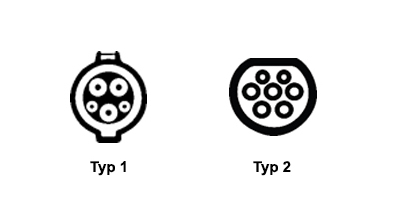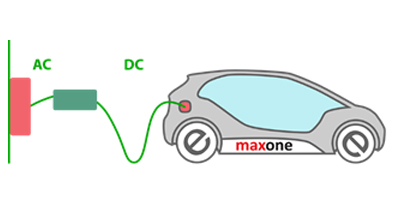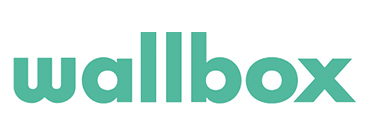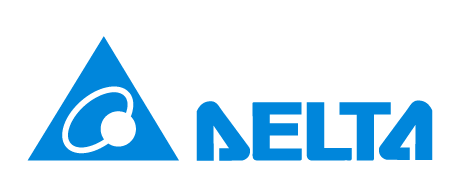Electromobility
MAXONE s.r.o. provides comprehensive solutions in the field of electric vehicle charging:
- Supply of charging and quick charging stations
- Installation, activation and commissioning
- Payment system
- Warranty and post-warranty service
Electricity, as the purest known form of energy, has also found its place in the automotive segment. Electric vehicles are becoming a common part of our roads, and ambitious projects around the world are pushing internal combustion engines out of cities and companies' fleets. An integral part of electric cars is the charging infrastructure, which, unlike conventional fuel stations, operates at several levels. From a conventional home socket or a small charging station in your garage to public multi-standard quick charging points.
Electromobility Delta
The Delta Group is the world's largest manufacturer of power supplies. The company's goal is to produce innovative, clean and energy-efficient solutions for better tomorrow. The most important values of the company are innovation, customer satisfaction, quality, teamwork and agility. Delta operates worldwide with production facilities in Taiwan, China, Thailand, Mexico, India and Europe. The broad product portfolio includes power and renewable energy solutions, solar energy systems, energy-efficient LED lighting products, commercial display systems such as video walls, LED and LCD screens and various projectors, industrial automation systems, electronic components for IT, telecommunications and automotive field.
Electromobility Ensto
Ensto is a family-owned and international cleantech company dedicated to developing, manufacturing and marketing electrical systems and supplies for power distribution, electrical applications and charging infrastructure for electric vehicles, with a commitment to sustainable development and an ambition to be the world leader in energy efficiency and distribution. The products, manufactured in seven different countries around the world, are environmentally friendly, energy-efficient and leave a minimum carbon footprint. As a family business, Ensto builds business on people, trust and environmental values on a long-term basis. The real needs of customers lead the company to find the right solutions with added value.
Charging stations DBT-CEV
DBT Charging Electric Vehicles is the pioneer of charging electric charging solutions in Europe. DBT was founded in 1990 and since 1992 has been actively involved in the charging of electric vehicles. In total, more than 1800 DBT-CEV quick charging stations are installed in 33 countries around the world. The current production capacity is 100 pcs per month. MAXONE, s.r.o. is the official distributor and service partner of DBT-CEV for the Slovak and Czech Republic. In total, we have over 40 DBT-CEV quick charging stations in service.
Electromobility in a nutshell
What is an electric car?
An electric car is an automobile that is propelled by an electric motor. The power of the electric motor is largely provided by an accumulator charged from external power sources.
What is a Plug-in hybrid?
A plug-in hybrid is a hybrid-powered car, with a combination of combustion and electric drive unit, the power source for the electric drive can be charged.
How to charge electric cars and hybrids?
Since the rise in commercial production and sale of electric automobiles, charging infrastructure standardization has come a long way. Electric vehicles sold in Europe support different charging standards, from which the consumer may initially have slight chaos.
Charging according to IEC 61851

The electric vehicle is connected to a standard wall socket, 230V or 400V, through the specific adapter which is supplied with the vehicle or can be purchased separately. The original adapter has a charging current of 10A / 1phase. On the market, there are products for an adjustment of the charging current up to 32A (with 3-phase outlets) in case the consumer has a power socket appropriate for such a current. The adapter does not change the nature of the electric current and voltage (does not change their size or frequency) but provides protection and communication with the vehicle during the charging process. The changeover from AC to DC takes place directly in the vehicle via the so-called on-board AC / DC converter.
At current up to 16A / 1phase we talk about slow charging.
Connectors used in Mode 2:


The electric car is connected to AC voltage via a specific connector of the charging station, which is generally non-transferable and connected to the distribution network by a fixed power supply. As with Mode 2, the charging station does not change the nature of the electric current and voltage (it does not change their size or frequency) but provides protection and communication with the vehicle during the charging process. The changeover from AC to DC takes place directly in the vehicle via the so-called on-board AC / DC converter. Available charging power ranges from 0-7kW for single-phase (up to 32A at 230V) and 0-22kW for three-phase (up to 32A at 400V). Real charging power limits the electric car itself, the power of the onboard AC / DC converter. Some types of electric vehicles (Tesla, Renault Zoe) are capable of receiving up to 43kW / 400V (i.e. 63A) AC. Charging capacities up to 7kW are referred to as slow charging; 7 - 22kW are referred to as medium-speed charging; and above 22kW are referred to as fast charging.
Connectors used in Mode 3:


The electric vehicle is connected via a specific DC voltage connector. The voltage is changed directly in the charging station, which is connected to the three-phase distribution network. Depending on the type of charging station, the available charging power may vary from 0 to 150kW (planned target is 350kW).
Connectors used in Mode 4:


















![[Electromobility 013]](../data/images/galerie/elektromobilita/003.jpg)
![[Electromobility 012]](../data/images/galerie/elektromobilita/004.jpg)
![[Electromobility 011]](../data/images/galerie/elektromobilita/002.jpg)
![[Electromobility 010]](../data/images/galerie/elektromobilita/001.jpg)
![[Electromobility 009]](../data/images/galerie/elektromobilita/005.jpg)
![[Electromobility 008]](../data/images/galerie/elektromobilita/elektromobilita_008.jpg)
![[Electromobility 007]](../data/images/galerie/elektromobilita/elektromobilita_007.jpg)
![[Electromobility 006]](../data/images/galerie/elektromobilita/elektromobilita_006.jpg)
![[Electromobility 005]](../data/images/galerie/elektromobilita/elektromobilita_005.jpg)
![[Electromobility 004]](../data/images/galerie/elektromobilita/elektromobilita_004.jpg)
![[Electromobility 003]](../data/images/galerie/elektromobilita/elektromobilita_003.jpg)
![[Electromobility 002]](../data/images/galerie/elektromobilita/elektromobilita_002.jpg)
![[Electromobility 001]](../data/images/galerie/elektromobilita/elektromobilita_001.jpg)
![[Electromobility 014]](../data/images/galerie/EV/DSC_0139.jpg)
![[Electromobility 015]](../data/images/galerie/EV/DSC_0141.jpg)
![[Electromobility 016]](../data/images/galerie/EV/DSC_0143.jpg)
![[Electromobility 017]](../data/images/galerie/EV/DSC_0144.jpg)
![[Electromobility 018]](../data/images/galerie/EV/DSC_0146.jpg)
![[Electromobility 019]](../data/images/galerie/EV/DSC_0165.jpg)
![[Electromobility 020]](../data/images/galerie/EV/DSC_0166.jpg)
![[Electromobility 021]](../data/images/galerie/EV/DSC_0168.jpg)
![[Electromobility 022]](../data/images/galerie/EV/IMG_20170522_103630.jpg)
![[Electromobility 023]](../data/images/galerie/EV/IMG_20170601_134255.jpg)
![[Electromobility 024]](../data/images/galerie/EV/IMG_20171009_1152156.jpg)
![[Electromobility 025]](../data/images/galerie/EV/IMG_20171010_1318257.jpg)